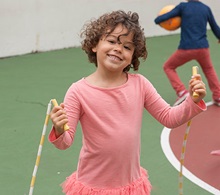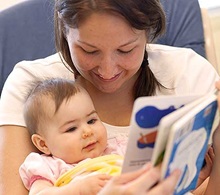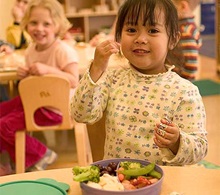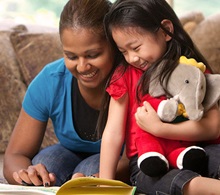 There are two words that can send your summer spirit soaring: “I’m bored!” Your child has suddenly gone from an action-packed school year to the carefree days of summer. As much as you are both happy to be done with homework for a while, all of this freedom can be problematic. You want to chill out with some lemonade yet your kids expect you to be the peppy cruise director. But it is possible for everyone to feel the joy of the season, make wonderful memories and be truly happy together. No more saying, “What can we do this summer?”
There are two words that can send your summer spirit soaring: “I’m bored!” Your child has suddenly gone from an action-packed school year to the carefree days of summer. As much as you are both happy to be done with homework for a while, all of this freedom can be problematic. You want to chill out with some lemonade yet your kids expect you to be the peppy cruise director. But it is possible for everyone to feel the joy of the season, make wonderful memories and be truly happy together. No more saying, “What can we do this summer?”
Provide Structure
Your child’s day needs a beginning, middle and end. This means more work for parents since they have to create the structure kids normally have in school. But it’s key to having a sane summer. First, kids thrive on structure and knowing what comes next. It keeps them feeling secure, avoids crankiness and gives their day purpose.
Second, maintaining some level of structure will help ease your kids back into the school year.
Create a Plan
An easy way to help provide structure is to make sure your kids know the daily plan. Talk briefly before bed about what’s in store the next day or lay it all out in the morning. Remind them (and yourself) that everyone needs to be flexible during the day and that there will also be downtime for the summer.
Make a summer calendar and write in special events, parties and trips so kids have a sense of an extended time-frame.
Set New Bedtimes
Or keep the same ones. Either way you need to have something firm in place. Summer allows you to be a bit flexible but kids still need 9 to 10 hours of sleep. Otherwise you have a cranky, moody kid who won’t even be able to smile on a trip to the amusement park. Yes, it’s ok to let the kids stay up late here and there for a special occasion.
Take a Class
The school year can be so jammed with after-school activities that your kids might have to miss out on a sport or class they really want to partake in. Take advantage of a less-scheduled summer to sign up for that special activity. The woodworking class that fills up so quickly in September probably has more room in July, anyway! Any class or even a morning camp program will provide daily structure, help give them a full experience of summer and expose them to new environments, says Dr. Bartell. Even better? You get some much-deserved time alone.
Go Outdoors
Take advantage of activities and events that are special to summertime. Go swimming, play tennis, enjoy an outdoor family concert or nature hike. Create a backyard obstacle course or treasure hunt. Have the kids help you pull out some overzealous ferns in the garden. Visit the farmers’ market and ask the kids help you choose local foods, then cook a meal together. Talk about the stars and constellations, then let them stay up late one night to study the beautiful night sky. Rainy days will mean more time inside watching movies. But it’s also the chance to go splash in muddy puddles (just go with it and do the laundry later) and hunt for worms.
Make it Memorable
The sun is shining. The breeze is refreshing and your daughter is not mercilessly teasing your son. Life is good. But while you might remember these small moments, the kids probably won’t. Incorporate a couple of memorable activities into your summer. That doesn’t mean you have to buy overpriced tickets to see the Fresh Beat Band or fly to Disneyland. Just think about your child’s specific interests and what would make her day. Sometimes the most impromptu plans makes the biggest impact.
Read!
We all know that reading books is important for kids. But the bond of reading together is what a summer lull can bring. Pull your child onto your lap, or get as physically close as they’ll let you — and read together, Dr. Ludwig suggests. Make the story come alive. Use funny voices. Act things out. Find hidden objects. And start a dialogue about the book. Set aside 20 minutes each day for reading time. Doing this will reinforce to your kids that reading is fun.
Get Creative
Kids depend too much on technology and they need to come up with their own ideas about what to do this summer. Ultimately, spending too much time with TV and the computer is just not satisfying and won’t create a memorable summer. Limit tech time to 3 hours daily. Turn off the technology and see what happens (after the whining stops). Let them use their imaginations to garden in the backyard, design their own t-shirts with fabric paint or plan a family art show.
Hire Help
Don’t feel guilty that you need a break. Summer can makes parents feel like they are on overload with an extra sense of responsibility. Hiring a sitter to come in at least once a week will provide kids with a new energy level and variety to their day. They will seriously look forward to it! Then you get to recharge or just get the shopping done without someone sneaking lots of sugary cereal into the cart. As if you wouldn’t notice…eventually.
Keep Summer Memories
Give your child a camera and let her take photos all school break of things that she feels are super cool. Maybe a Lego tower, a rose bush in full bloom or the neighbor’s dog. Hold back on directing and you’ll be able to see summer through your child’s eyes. Review the photos weekly and talk about all the adventures you had together. Help her create a memory book or online album when the season ends.
Slow Down
Parents don’t feel pressure to start the day in the summer. Begin later and go slower. When there’s no school bus to catch or traffic to beat you don’t need to be dressed and out by 7:45. Stop chasing your son around with his jeans and teach him to put them on himself — in his own time. Cook up pancakes for breakfast instead of grabbing a slice of wheat bread. Savor your coffee, don’t slurp it hurriedly. Unless you have an a.m. activity planned, use the morning to relax. Summer goes by so fast!
We want to hear from you. Set up an appointment today and find out how much your children will love Premier Academy!
Premier Academy Child Enrichment Center, offers childcare in Omaha, Nebraska for infants, toddlers, preschool, and pre-k children.

 Your child isn’t going to become a great reader over night, but it can happen one book at a time. But what is the best way for you to choose the right book for your child to read?
Your child isn’t going to become a great reader over night, but it can happen one book at a time. But what is the best way for you to choose the right book for your child to read? One of the most common struggles parents have is dealing with picky eaters. Does any of this sound familiar to you?
One of the most common struggles parents have is dealing with picky eaters. Does any of this sound familiar to you? Have a real one-on-one conversation with any preschooler, and you’re in for a treat — kids are soaring with ideas. As a mom, an educator, and an entrepreneur, I wondered: When do kids lose their imagination? And what can we do to foster creative thinking skills at home?
Have a real one-on-one conversation with any preschooler, and you’re in for a treat — kids are soaring with ideas. As a mom, an educator, and an entrepreneur, I wondered: When do kids lose their imagination? And what can we do to foster creative thinking skills at home? Hosting a playdate at home is one thing but going to someone else’s house – where the rules, snacks, and potty are different – is a whole new experience. Here’s how to prepare your child to have a great time – and be invited back!
Hosting a playdate at home is one thing but going to someone else’s house – where the rules, snacks, and potty are different – is a whole new experience. Here’s how to prepare your child to have a great time – and be invited back! Planning a family picnic is the perfect activity for fun summer learning. With all the outside games and food, it’s easy to see why your kids will never know you have a secret curriculum up your sleeve! Here are 15 great tips to make your summer picnics full of learning – AND lots of fun:
Planning a family picnic is the perfect activity for fun summer learning. With all the outside games and food, it’s easy to see why your kids will never know you have a secret curriculum up your sleeve! Here are 15 great tips to make your summer picnics full of learning – AND lots of fun: This new journey of preparing your child for Pre-K is a very important time in your child’s life. If you have placed your child in pre-school, this may be a very easy transition. At Premier Academy in Omaha and Elkhorn, our goal is to not only help your children but to help our parents!
This new journey of preparing your child for Pre-K is a very important time in your child’s life. If you have placed your child in pre-school, this may be a very easy transition. At Premier Academy in Omaha and Elkhorn, our goal is to not only help your children but to help our parents! When it comes to child care, as a parent, there are a few things you should be looking out for when visiting daycare centers. We all want to send our child to a high standard, and good working preschool. As parents, we should always want to give our kids the best head start in life, and by far the most effective way to start with this is to send your kids to a high quality child care center. Kids need to socialize with other children from a very young age, it allows them to become familiar to social interaction, sharing and good manners, this is what your child will gain from attending a preschool. Not only will they learn how to act and behave around others, they will learn valuable reading and writing skills. Statistics show that kids who don’t attend preschools and head straight into schools have a much harder time learning than the children who did attend preschools. These statistics come in very handy when trying to give your kids the best head start in life, and it’s obvious which choice you should make.
When it comes to child care, as a parent, there are a few things you should be looking out for when visiting daycare centers. We all want to send our child to a high standard, and good working preschool. As parents, we should always want to give our kids the best head start in life, and by far the most effective way to start with this is to send your kids to a high quality child care center. Kids need to socialize with other children from a very young age, it allows them to become familiar to social interaction, sharing and good manners, this is what your child will gain from attending a preschool. Not only will they learn how to act and behave around others, they will learn valuable reading and writing skills. Statistics show that kids who don’t attend preschools and head straight into schools have a much harder time learning than the children who did attend preschools. These statistics come in very handy when trying to give your kids the best head start in life, and it’s obvious which choice you should make. There are two words that can send your summer spirit soaring: “I’m bored!” Your child has suddenly gone from an action-packed school year to the carefree days of summer. As much as you are both happy to be done with homework for a while, all of this freedom can be problematic. You want to chill out with some lemonade yet your kids expect you to be the peppy cruise director. But it is possible for everyone to feel the joy of the season, make wonderful memories and be truly happy together. No more saying, “What can we do this summer?”
There are two words that can send your summer spirit soaring: “I’m bored!” Your child has suddenly gone from an action-packed school year to the carefree days of summer. As much as you are both happy to be done with homework for a while, all of this freedom can be problematic. You want to chill out with some lemonade yet your kids expect you to be the peppy cruise director. But it is possible for everyone to feel the joy of the season, make wonderful memories and be truly happy together. No more saying, “What can we do this summer?”